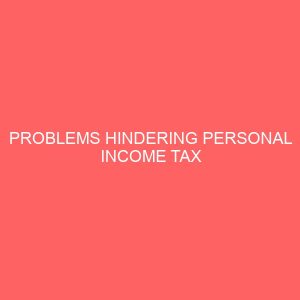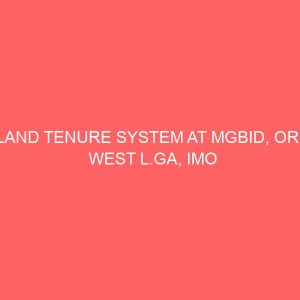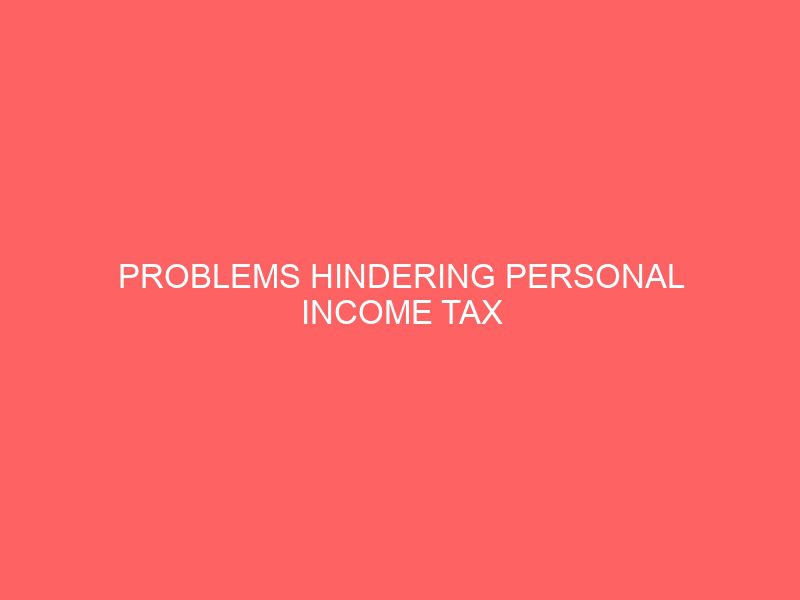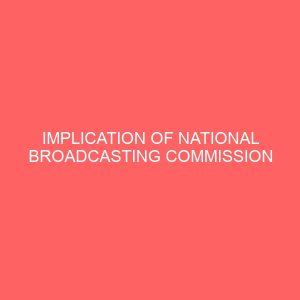Description
CHAPTER ONE
INTRODUCTION
BACKGROUND OF THE STUDY
Tax is an important factor in the economic planning and development of a nation and it is an important agent of social change, Ola 2005. Tax according to Agyesi 2001, is the transfer of resources from private sectors to the nations economic and social goals. Furthermore, tax is a compulsory levy imposed on the payer who are the citizens by a legal authority or recipient public authority. Throughout the history of mankind, the right to raise tax has been one of the principal features of political authority.
Tax is an instrument of fiscal policy, which plays a leading role in every organized society, irrespective of the political or constitutional structure. Once a society becomes stabilized, civilized or law abiding, the functions of the government becomes enormous resulting in heavy expenditure and necessitating tax payment by its subjects. For a developing country like Nigeria, the primary economic goal is to increase the rate of economic growth and hence, the per capital income which will lead to higher standard of living.
Three main methods of financing economic expenditure in most developing economics include, taxes and other current receipts such as the profit of public enterprises, loans and grants of these sources, tax is perhaps the most important since the level of government expenditures is to a great extent dependent on the ability of the tax system to place the required revenue at the disposal of government. Hence, Samuelson 1980 wrote that, deciding to tax people, the people are really deciding how resources needed for social wants shall be taken from all the various families and from the enterprises they own and made available for the provision of social goals and services.
Again, since the market system proves inadequate for ensuring stable price and steady growth, tax has to be used to bring about employment, stable price and steady growth. In addition, tax is meant to ensure, at times, a transfer of resources from the hands of the private to the hands of the public or the government for investments, modification of patterns of investment and mitigating economic inequalities.
All these aims are far from being achieved in Nigeria societies. The tax system is failing in almost all the above respects. Therefore, there must be crucial problems militating against efficient and effective tax administration in Nigeria.
There have been discussions on the problems posed by the dwindling fortune in the oil economy. This problem is acute because of the undue reliance on the federal government for the bulk of the operating revenue in the state. All the states of the federation are now required to intensify their efforts towards the internally generated revenue to make up the allocations from the federation account. Unfortunately, the problem engendered in the internally generated revenue is more acute in the newly created states. Before being carved out, these states were doing fairly well with what they collected within their confines. In Enugu State, the problem of inefficient tax collection is highly pronounced. Due to lack of fund, the state was unable to fulfill its obligations to the citizenry. The present emphasis on rural development has subdued the state with the problems of socioeconomic development of the rural communities. Beside political duties, it is expected to provide good roads, health services, primary and secondary education, good environmental sanitation among other things, to her people. As a result of the governments inability to meet with its obligations, the people have resorted to selfhelp projects or programmes in most communities.
Observations have shown that, the number of selfhelp projects in most communities outnumbers the governments projects therein. These failures are attributed to the numerous problems militating against efficient tax collection in the states as shown by this project.
In spite of the broad nature of taxes, the tax payers are usually on the look out for loopholes which they could exploit and pay less tax to the government. Besides the corrupt tax officials, evidence refusing to pay tax entirely and tax evasion act by which the amount of tax payable is dishonestly reduced in Enugu State. As a result of the role and importance of tax as an instrument of fiscal policy, the vital source of governments revenue, taxation becomes an important area of study. But because of the failure of taxation to effectively collate resources, secure equitable income distribution and properly regulate the econocollateral function of a good tax system and above all, provide the government with the much needed revenue to meet its various obligations, it is strongly convinced that, there must be some crucial problems militating against effective and efficient tax administration in Enugu State and Nigeria as a whole. Hence a study of problems of tax administration and collection with particular reference to Enugu State is hereby being undertaken to Xray with a view of finding these problems, their degree of impediment, the likely prospects and proffering recommendations of action that will ensure effective and efficient tax administration and collection mechanism in Enugu State in particular and Nigeria in general.
1.2STATEMENT OF THE PROBLEMS
There have been a heart provoking outcry by various state governments in Nigeria over their poor financial base. The situation is becoming even more compounded by the obvious dwindling feature of our oil economy. Moreover, in spite of the broadness and the comprehensive nature of our tax system, tax avoidance and tax evasion are on the increase. This ugly development has placed most state governments in a situation where they cannot cope with their civic responsibilities to their citizens, hence a compelling need to put an end to these unwholesome circumstances through proper problem identification;
It has been a problem to understand the extent to which resources, human/material are adequate for the management of Enugu State Board of Internal Revenue ESBIR.
It has also been a problem to determine the extent to which the objectives of the organizations are being achieved.
Also, it is a problem to determine the relationship between the ignorance of tax benefits and the unwillingness of tax payers to pay their taxes and so fulfill their civic obligations.
It is difficult to ascertain the extent to which the Enugu State Board of Internal Revenue ESBIR has realized its targets on priority areas of personal income tax administration.
1.3RESEARCH QUESTIONS
Below are the research questions to which the study would be based on.
To what extent are the resources human / material adequate for the management of ESBIR Enugu State Board of Internal Revenue
To what extent have the objectives of the organizations been achieved in the recent past
What is the relationship between the ignorance of tax benefits and the unwillingness of tax payers to fulfill their tax obligations
To what extent has the board realized its targets on priority areas of personal income tax administration








Reviews
There are no reviews yet.